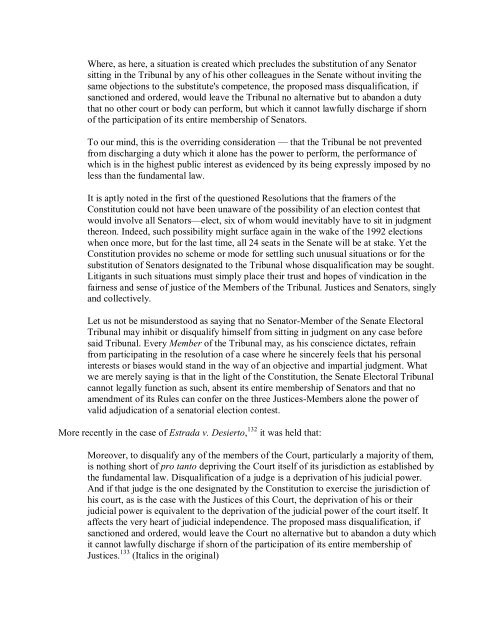Republic of the Philippines SUPREME COURT Manila ... - Columba.us
Republic of the Philippines SUPREME COURT Manila ... - Columba.us
Republic of the Philippines SUPREME COURT Manila ... - Columba.us
Create successful ePaper yourself
Turn your PDF publications into a flip-book with our unique Google optimized e-Paper software.
Where, as here, a situation is created which precludes <strong>the</strong> substitution <strong>of</strong> any Senator<br />
sitting in <strong>the</strong> Tribunal by any <strong>of</strong> his o<strong>the</strong>r colleagues in <strong>the</strong> Senate without inviting <strong>the</strong><br />
same objections to <strong>the</strong> substitute's competence, <strong>the</strong> proposed mass disqualification, if<br />
sanctioned and ordered, would leave <strong>the</strong> Tribunal no alternative but to abandon a duty<br />
that no o<strong>the</strong>r court or body can perform, but which it cannot lawfully discharge if shorn<br />
<strong>of</strong> <strong>the</strong> participation <strong>of</strong> its entire membership <strong>of</strong> Senators.<br />
To our mind, this is <strong>the</strong> overriding consideration — that <strong>the</strong> Tribunal be not prevented<br />
from discharging a duty which it alone has <strong>the</strong> power to perform, <strong>the</strong> performance <strong>of</strong><br />
which is in <strong>the</strong> highest public interest as evidenced by its being expressly imposed by no<br />
less than <strong>the</strong> fundamental law.<br />
It is aptly noted in <strong>the</strong> first <strong>of</strong> <strong>the</strong> questioned Resolutions that <strong>the</strong> framers <strong>of</strong> <strong>the</strong><br />
Constitution could not have been unaware <strong>of</strong> <strong>the</strong> possibility <strong>of</strong> an election contest that<br />
would involve all Senators—elect, six <strong>of</strong> whom would inevitably have to sit in judgment<br />
<strong>the</strong>reon. Indeed, such possibility might surface again in <strong>the</strong> wake <strong>of</strong> <strong>the</strong> 1992 elections<br />
when once more, but for <strong>the</strong> last time, all 24 seats in <strong>the</strong> Senate will be at stake. Yet <strong>the</strong><br />
Constitution provides no scheme or mode for settling such un<strong>us</strong>ual situations or for <strong>the</strong><br />
substitution <strong>of</strong> Senators designated to <strong>the</strong> Tribunal whose disqualification may be sought.<br />
Litigants in such situations m<strong>us</strong>t simply place <strong>the</strong>ir tr<strong>us</strong>t and hopes <strong>of</strong> vindication in <strong>the</strong><br />
fairness and sense <strong>of</strong> j<strong>us</strong>tice <strong>of</strong> <strong>the</strong> Members <strong>of</strong> <strong>the</strong> Tribunal. J<strong>us</strong>tices and Senators, singly<br />
and collectively.<br />
Let <strong>us</strong> not be misunderstood as saying that no Senator-Member <strong>of</strong> <strong>the</strong> Senate Electoral<br />
Tribunal may inhibit or disqualify himself from sitting in judgment on any case before<br />
said Tribunal. Every Member <strong>of</strong> <strong>the</strong> Tribunal may, as his conscience dictates, refrain<br />
from participating in <strong>the</strong> resolution <strong>of</strong> a case where he sincerely feels that his personal<br />
interests or biases would stand in <strong>the</strong> way <strong>of</strong> an objective and impartial judgment. What<br />
we are merely saying is that in <strong>the</strong> light <strong>of</strong> <strong>the</strong> Constitution, <strong>the</strong> Senate Electoral Tribunal<br />
cannot legally function as such, absent its entire membership <strong>of</strong> Senators and that no<br />
amendment <strong>of</strong> its Rules can confer on <strong>the</strong> three J<strong>us</strong>tices-Members alone <strong>the</strong> power <strong>of</strong><br />
valid adjudication <strong>of</strong> a senatorial election contest.<br />
More recently in <strong>the</strong> case <strong>of</strong> Estrada v. Desierto, 132 it was held that:<br />
Moreover, to disqualify any <strong>of</strong> <strong>the</strong> members <strong>of</strong> <strong>the</strong> Court, particularly a majority <strong>of</strong> <strong>the</strong>m,<br />
is nothing short <strong>of</strong> pro tanto depriving <strong>the</strong> Court itself <strong>of</strong> its jurisdiction as established by<br />
<strong>the</strong> fundamental law. Disqualification <strong>of</strong> a judge is a deprivation <strong>of</strong> his judicial power.<br />
And if that judge is <strong>the</strong> one designated by <strong>the</strong> Constitution to exercise <strong>the</strong> jurisdiction <strong>of</strong><br />
his court, as is <strong>the</strong> case with <strong>the</strong> J<strong>us</strong>tices <strong>of</strong> this Court, <strong>the</strong> deprivation <strong>of</strong> his or <strong>the</strong>ir<br />
judicial power is equivalent to <strong>the</strong> deprivation <strong>of</strong> <strong>the</strong> judicial power <strong>of</strong> <strong>the</strong> court itself. It<br />
affects <strong>the</strong> very heart <strong>of</strong> judicial independence. The proposed mass disqualification, if<br />
sanctioned and ordered, would leave <strong>the</strong> Court no alternative but to abandon a duty which<br />
it cannot lawfully discharge if shorn <strong>of</strong> <strong>the</strong> participation <strong>of</strong> its entire membership <strong>of</strong><br />
J<strong>us</strong>tices. 133 (Italics in <strong>the</strong> original)


